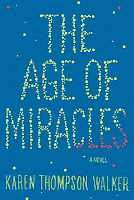I've never been a person to read the last few pages of a book before I read the first, but I think I'm going to start having to make an exception for reading the author's bio. A few key words that will immediately make me skeptical of the book's ability to rate on the (coveted, obvs.) Tika Scale of Success are:
Début novel
Lives in Brooklyn
Picture with fingers in hair and self-deprecating smile
I actually took the time to Post-it flag this novel, complete with comments on said flags. They read, in order:
"One of the banes - hah!"
Sentence frags errwherrrrr!
POOR WRITING ->
UGH
WTF is this?
Would it kill you to use a :?
Ok CE [copy editor], ":" =/= "is"
Homophone vs. synonym
Let's begin with the sentence fragments, shall we? Modern writers and readers understand that sentence fragments can be used to great effect. We've eschewed the idea that a sentence must have a subject and a verb to make sense because we understand context.
HOWEVER.
With great effect comes the great responsibility to not over-use the grammatical linguistic phenomenon to the point of reader exhaustion. (In the future, people will categorize the 2000's-2010's literary style as the Sentence Fragment Era.) Observe:
"We arrive at the warehouse just after nightfall. Part of an eerie industrial park. Abandoned and unused, seated behind the railroad tracks on the outskirts of Oscawana." (p.51)
 |
| I have a less emphatic "no no no" gif, but it wasn't getting the job done. |
"The scariest thing: that somehow I'm meant to be here, at this kitchen table, forever, for all time, watching these two women make chicken cacciatore." (p. 143)As mentioned above, a colon does not function as the word "is." Punctuation is not to be thrown out (OR IN) all willy-nilly without-a-plan. It serves a purpose. It adds meaning. You are driving me to italics, Kris. And chicken cacciatore is awesome.
My dear copy editor of this wretched novel, do not think I've overlooked you! Let's have a little discussion about homophones, shall we? They're words that sound alike but are spelled differently, for those not keeping up (you).
One does not wave ones' rights. One waives them.
One does not steer from the yolk of a plane, but from the yoke.
Colons function not as verbs (see above) but as denoters of lists. Observe:
I make a list of everything in the attic: [correct!]
Stacks of framed pictures. Grandma and Grandpa on the shores of Cape Cod. Chip, Elissa, and me in front of the Louvre. Our parents' wedding. Birthdays. Graduations. Proms. [NO!] (p. 123)Allow me to refer you to the Tracy Morgan gif directly above, because Grandma and Grandpa on the shores of Cape Cod are not, in fact, things in the attic. Neither is your parents' wedding, etc. So, in closing, I'd like to take you out back for a little grammar/punctuation/learn-to-do-your-job lesson.
And the story is basically this guy who lives with his family and has to help them and he whines about it all the time because he's 24 and he wants to be freeeeeee! Which makes me want to punch him in the face. And then, you guys, something happens at the end that makes me feel guilty for hating this book. Which, perversely, makes me hate it even more.
In conclusion, this book is bullshit and I hated it.
2 out of 11 Ichabod Cranes.


























